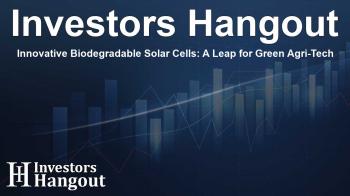Innovative Biodegradable Solar Cells: A Leap for Green Agri-Tech

Transforming Agriculture with Biodegradable Solar Cells
As the agricultural sector evolves with digitalization, the demand for innovative and sustainable electronics is growing. This has led to the development of new technologies aimed at enhancing farming efficiency while minimizing environmental impact. VTT has taken a pioneering step forward by introducing a biodegradable solar cell module, tailored for agricultural use, in an ongoing green electronics research initiative.
VTT's Revolutionary Design
The newly developed solar cell module by VTT is impressively compact and lightweight, measuring approximately the size of a credit card. This allows it to be seamlessly integrated into plants, such as being attached directly to their stems or large leaves. Notably, this innovative solar cell is incredibly flexible and thin, designed to decompose naturally into the soil after the growing season, along with the energy it generates.
Maria Smolander, Research Team Leader at VTT, emphasizes the importance of biodegradability in agricultural applications, stating, "When a solar cell is used in an agricultural setting, biodegradability is essential. If it cannot be removed, it poses no harm to the soil or environment, preventing any leaching of harmful substances or exacerbating the microplastics issue." This breakthrough allows for the integration of sensors into agriculture, which previously suffered from limited adoption due to concerns around waste.
Collaboration for Sustainable Solutions
This development is part of a three-year international research project aimed at creating fully degradable cultivation sensors. Alongside VTT, several esteemed institutions, including Tampere University and the University of Glasgow, have joined forces in this endeavor, receiving backing from both CHIST-ERA and national funding sources.
Liisa Hakola, a Senior Scientist at VTT, explains that while agriculture provides a practical platform for testing these new electronics, the broader goal is to innovate electronics to be more environmentally friendly. This project has not only developed eco-conscious solar cells but also a supercapacitor for energy storage, promoting the idea of compostable sensors for data transmission.
Prioritizing Lightness and Efficiency
VTT’s solar cell embodies a commitment to low-energy, effective monitoring of environmental conditions. As Marja Välimäki, Senior Scientist at VTT, highlights, "The goal isn't to generate vast amounts of energy but to power low-energy sensors for real-time monitoring of the environment. The solar cell's function is not to compete with conventional cells, nor does it need an extended operational life span." This strategic focus ensures the solar cells meet the demands of agricultural monitoring without burdening the ecosystem.
Unique Material Considerations
Developing a biodegradable solar cell poses unique design challenges, as highlighted by the VTT team. The material composition must withstand environmental stressors, such as heat and moisture, while maintaining structural integrity. Dependence on biodegradable materials means that they must carefully select components that do not degrade prematurely. Liisa Hakola notes the importance of ensuring that any sensors remain lightweight, which is crucial for attachment to plants.
Regulatory Demands and Future Implications
The increasing need for precise data collection in agriculture aligns with evolving regulations. For example, farmers are required to analyze nutrient loads in soil samples regularly. The introduction of the biodegradable solar cell allows for a sustainable energy solution that promotes advanced data collection and environmental monitoring.
Furthermore, VTT is actively involved in other eco-friendly initiatives, including solar cells developed under an IoT research project. This project aims to combine sensor technology with environmentally sustainable practices, cultivating a circular economy that emphasizes clean solutions for the agricultural industry.
Contact for More Information
For further details about the biodegradable solar cell and VTT's innovative projects, individuals can reach out to the designated contacts at the VTT Technical Research Centre.
Frequently Asked Questions
What is VTT's biodegradable solar cell?
It is a compact, flexible solar cell designed to be attached to plants and decompose naturally after use, minimizing environmental impact.
Why is biodegradability important in agricultural technology?
Biodegradability ensures that electronics do not contribute to soil contamination or microplastic pollution, promoting a healthier ecosystem.
How do these solar cells impact agricultural practices?
They enable low-energy sensors for real-time environmental monitoring, which can enhance crop yields and reduce emissions.
Who collaborated on this research project?
VTT worked alongside Tampere University, the University of Glasgow, and other esteemed institutes to develop these innovative technologies.
What are the future plans for VTT in sustainable electronics?
VTT aims to further integrate eco-friendly technologies into agriculture and continue research projects focusing on clean, sustainable solutions.
About The Author
Contact Lucas Young privately here. Or send an email with ATTN: Lucas Young as the subject to contact@investorshangout.com.
About Investors Hangout
Investors Hangout is a leading online stock forum for financial discussion and learning, offering a wide range of free tools and resources. It draws in traders of all levels, who exchange market knowledge, investigate trading tactics, and keep an eye on industry developments in real time. Featuring financial articles, stock message boards, quotes, charts, company profiles, and live news updates. Through cooperative learning and a wealth of informational resources, it helps users from novices creating their first portfolios to experts honing their techniques. Join Investors Hangout today: https://investorshangout.com/
The content of this article is based on factual, publicly available information and does not represent legal, financial, or investment advice. Investors Hangout does not offer financial advice, and the author is not a licensed financial advisor. Consult a qualified advisor before making any financial or investment decisions based on this article. This article should not be considered advice to purchase, sell, or hold any securities or other investments. If any of the material provided here is inaccurate, please contact us for corrections.

